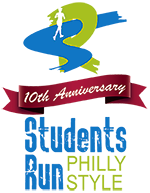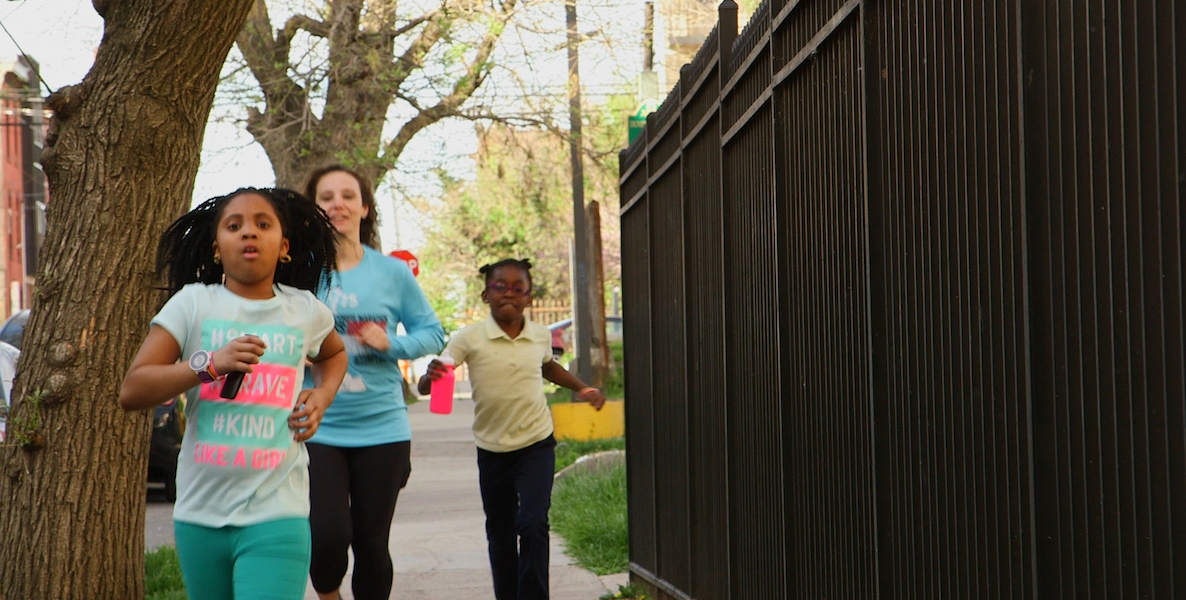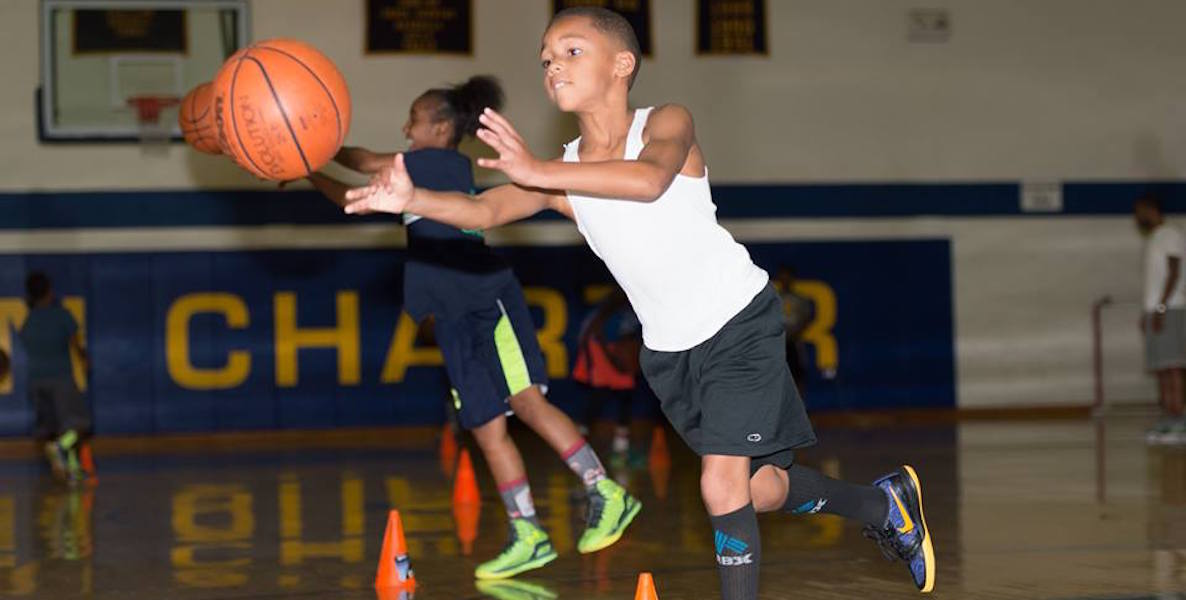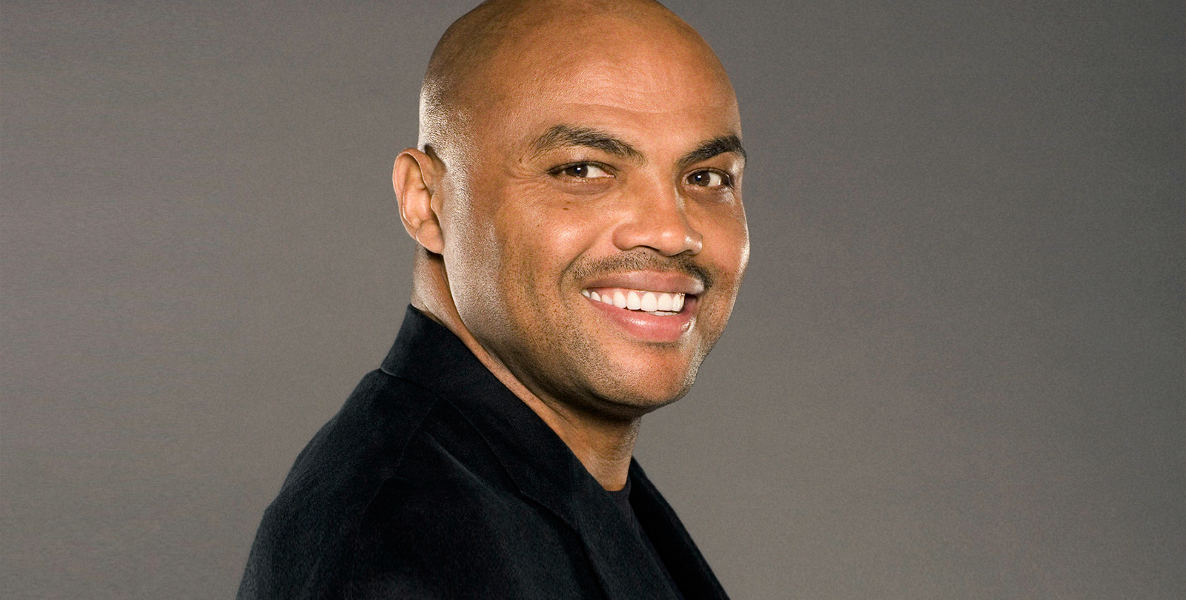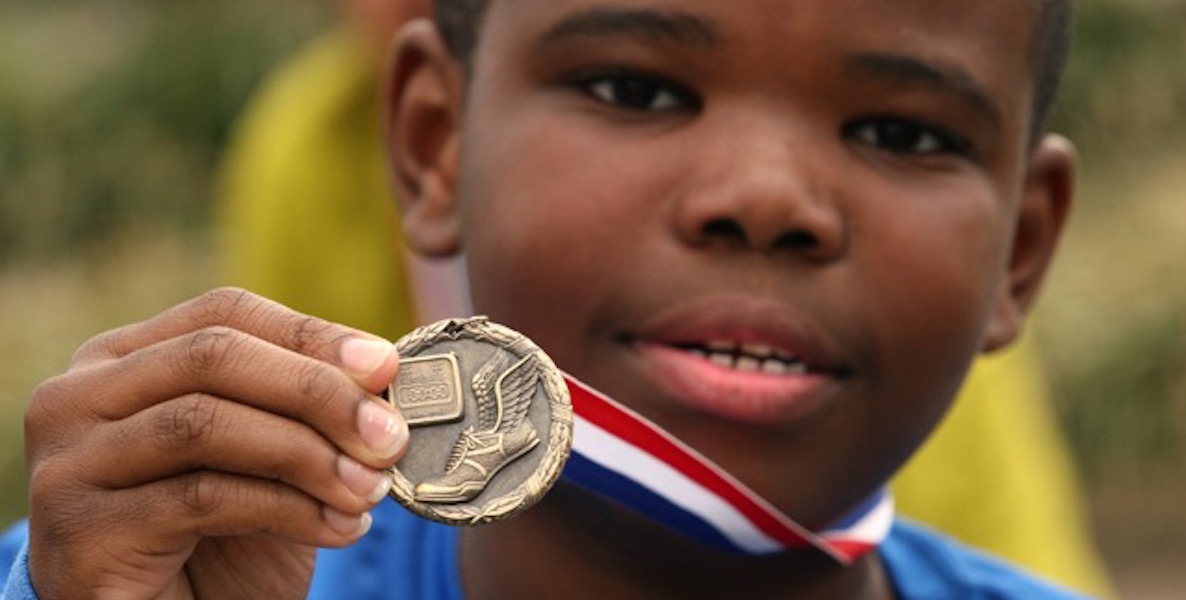At a recent Broad Street Run, when thousands of Philadelphians turned out for the city’s most celebrated race of the year, there was one high school student who found the 10 miles especially challenging: Roy Bowser had lost weight in the course of his training, but the high school sophomore was still overweight, and his doctor had warned him that running 10 miles could be damaging to his joints.
But that didn’t stop him. A member of a Students Run Philly Style team at Walter Biddle Saul High School of Agricultural Sciences, Roy was determined to run Broad Street. And Students Run Philly, a citywide running/mentoring program, was determined to help him do it. Every mile on Broad Street, someone from Students Run checked up on Roy to make sure he was okay. Finally, when he was about a mile out, word got to the finish line that he was close—but struggling. So his teammates, all of whom had completed the race, took off running—back up Broad Street. They found Roy and, yelling encouragements the whole time, ran the last mile to the Navy Yard with him.
“That’s what happens,” says Andy Kucer, executive director of Students Run Philly. “These students are a team. They help each other to achieve their goals. They’re in it together and want to see everyone succeed.”
Students Run Philly sends several hundred runners every year to Broad Street, which is the short-term goal for their running season, which starts in late February. This month, they had 1,300 middle- and high-schoolers at the rain-logged race, all but one of whom finished. (He sprained his ankle about eight miles in.) It is the largest student running group in the city, with teams in 55 public, parochial and charter schools in every zip code of Philadelphia. It’s free to the school and students, and almost entirely volunteer-run, 80 percent by school staff and 20 percent from community members. (Students Run has six paid employees, and 323 volunteers.)
91 percent of Student Run 12th graders graduate high school; and 90 percent of those are accepted into four year colleges. (Citywide, the graduation rate is 65 percent; 58 percent of those go to college.) Forty-one percent increased their G.P.A., and 50 percent decreased their incidents of violent behavior.
Its popularity, in part, is because of its simplicity. Running is, after all, the easiest of sports: It’s free, everyone basically knows how to do it, and all you need is a pair of sneakers. (Students Run buys all participants running shoes, the first new pair some of the kids have ever had; it was the way they identified their garbage bag-clad students during this year’s rainy Broad Street Run.) The health effects of running are well-known—besides helping to lose weight and be fit, running is also a stress-reliever, something particularly beneficial to kids in challenging neighborhoods who often are on heightened alert. Running can become a lifelong habit. And it can be contagious: Kucer says at their annual banquet, it is not just students who stand up with pride at their accomplishments, but also their parents. “Kids will say they’ve lost 30 pounds running,” he says, “and then their mom will stand up and say she lost 40 pounds.”
But running is also a stand-in for the life skills students need to succeed—grit, determination, hard work, resilience. Like other effective out of school programs, Students Run Philly teaches one simple thing, but opens a world of possibilities. “The vehicle of running is a metaphor,” Kucer says. “A lot of obstacles happen between day one and the marathon. There are days that they don’t want to put their shoes on and get up at 7 AM on Saturday and go running. But they realize, ‘I can overcome this, I can make this work.’”
Students Run Philly Style started in 2004 as a program of the National Nurse-led Care Consortium, which had seen great success with a running project in Los Angeles. (L.A. still has the largest Students Run group.) That first year, 50 students participated, in neighborhood community centers. It has grown every year since, almost entirely by word of mouth, especially since founder Heather McDanel realized setting up in schools was a better way to ensure student participation. (McDanel stepped down as executive director this year.) The largest team, with about 100 students, is at Academy at Palumbo; others have just a handful of students. Funded primarily by foundations and corporate sponsors, Students Run spends $1,000 per student, for supplies and race entry fees.
Hank, 16, says that running appealed to him at first as a way to hang out with his friends after school. Soon, though, it became a much-needed outlet to stave off what he says was increasing depression. “Running helps me express my emotions,” he says. “It pushed my depression into the dirt.”
At every school, teams are led by a staff member, who pairs students with an adult mentor, usually at a ratio of four runners to one adult. Those adults help keep students on track, run with them during the races, and train alongside them; some, like their pupils, have never run before. But they become mentors in more than just the foot race. Kucer says the hours of training are akin to the experience of driving a car with your children: It’s when the toughest conversations often take place. “Kids are spilling out everything to their mentors,” he says.
Before the season starts, Students Run holds an intensive one-day training session for every volunteer which helps them navigate their relationships with their students, and how to bring out the best in them. Those relationships are what keep kids coming back, year after year; Kucer says very few students stop running after one season. And it’s what has helped to fuel Students Run’s success off the pavement.
The program’s core values are courage, effort and respect. Grades and school behavior don’t matter to them, so long as the students are embodying those traits. But inevitably, the effects ripple outwards, to better grades, school attendance, connection to peers and adults, and confidence. A two-year study of the program found that 91 percent of Student Run 12th graders graduate high school; and 90 percent of those are accepted into four year colleges. (Citywide, the graduation rate is 65 percent; 58 percent of those go to college.) Forty-one percent increased their G.P.A., and 50 percent decreased their incidents of violent behavior.
Hank Schaefer, who’s now 16, joined Students Run when he was in sixth grade, at Mayfair Elementary. Now a sophomore at New Foundations Charter High School, Hank is on the school track team—but still bolts back to Mayfair twice a week to train with the Students Run team there. “Even if I’m in pain, and can’t run anymore that day, I show up to help,” Hank says. “It’s like my second family.” Hank says that running appealed to him at first as a way to hang out with his friends after school. Soon, though, it became a much-needed outlet to stave off what he says was increasing depression. “Running helps me express my emotions,” he says. “It makes me feel energetic, and happy all the time. When I’m running a race, I feel like I’m climbing a mountain. It pushed my depression into the dirt.”
“A lot of obstacles happen between day one and the marathon,” Kucer says. “There are days that they don’t want to put their shoes on and get up at 7 AM on Saturday and go running. But they realize, ‘I can overcome this, I can make this work.’”
The students in Students Run Philly are evenly split between girls and boys, and are a diverse bunch: Around 40 percent African American and 20 percent each caucasian, Latino and Asian. (Mentors are primarily white, but Kucer says the organization is working to mix that up more, as well.) Some of the students are athletes already; most attend schools that have no sports, and have never done any sort of exercise. “The majority of the kids who are new have never run around the block, much less a mile,” Kucer says. “Eight weeks later, they’re running 10 miles.”
Students Run’s main season runs from late February to June, ending with a race on Belmont Plateau. Every week, the school teams train for a minimum of 10 hours, and collectively run with other schools in their geographic area on Saturday mornings. During the summer, about half the participants drop off, in part because it’s difficult for students who attend charters to get to team practices from their homes all over the city. The rest continue training, with the goal of running the Philadelphia Marathon in November.
Kucer says Students Run is now trying to figure out a way to increase summer participation, to maintain the connection with students throughout the year because they have seen that a longer commitment to the program has a larger impact on students. They have also undertaken a project with Temple University to evaluate the long-term effects of Students Run Philly on the close to 5,000 kids who have gone through the program. Meanwhile, Kucer says he expects Students Run to grow again next year, and the year after—a (literal and figurative) movement that is changing lives.
“Every kid has the strength to achieve their goals,” says Kucer. “We provide a safe space to set those goals and reach for them, with the support of a mentor, and then encourage them to then find other avenues in which to set and reach goals. As individuals, they’re seeing the strength within themselves.”
A previous version of the story misstated the date on which Students Run was founded in Philadelphia. It was 2004. It also misstated the year Roy Bowser ran Broad Street; it was not last year.
Photo Header: Shameek Ransom shows off his medal. Photo by Al Cassidy


